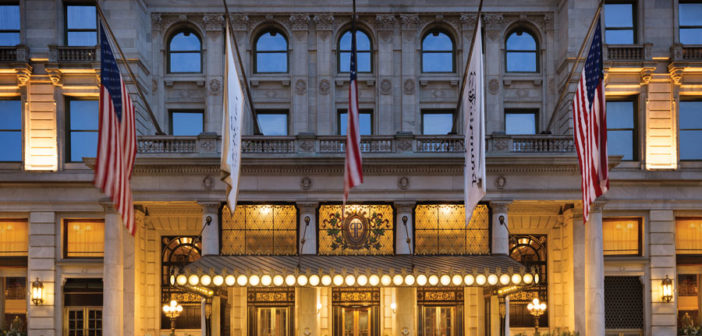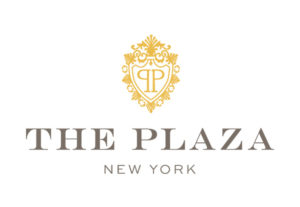NEW YORK—Just as she was celebrating her 110th birthday on Oct. 1, New York’s grande dame hotel, The Plaza, was being courted by any number of suitors looking to pledge their fortunes to have the storied beauty for their own.
Or at least 75% of her.
That’s what’s on the block for those bidding to be the majority owner of The Plaza in this latest chapter currently being written regarding the Fifth Ave. landmark’s chain of ownership.
According to Jeffrey Davis, international director of JLL’s Hotels and Hospitality Group, which is advising Sahara U.S. Corp. on the sale of its stake in the hotel, what’s being offered “includes 75% interest in everything within the real estate of the hotel, including the hotel, the retail and unsold condo-hotel units.”
The Plaza is managed by Fairmont Hotels & Resorts, part of AccorHotels. It has 130 hotel rooms, 152 condo-hotel units (of which 100 are unsold) and approximately 132,000 sq. ft. of retail.
The hotel, which has kept the real estate and hotel industries buzzing over the past several years with potential deals for parts or all of it, was officially on the market this past summer, with the JLL group actively marketing it for about six weeks, taking offers in the third week of October.
“We’ve had quite a bit of interest in the asset,” said Davis.
Managing Director Gilda Perez-Alvarado, who also leads JLL’s Global Hotel Desk, is working with Davis on the sale, with support from JLL VP Brady Rice.
JLL’s Hotels and Hospitality Group has an existing relationship with Sahara; its asset management group handles the asset.
“The Plaza is the most iconic piece of trophy real estate in the world and has long stood as Manhattan’s preeminent luxury hotel,” stated Davis. “This offering gives investors the opportunity to establish an immediate presence with a trophy asset in a high-barrier-to-entry market.”
No price is being indicated, he added.
A recent report in The Wall Street Journal noted that based on the total number of guestrooms (282), “that would bring a sales price of more than $500 million.”
As far as an assessed value, “It’s too early to tell,” Perez-Alvarado said.
“It is rare to find an opportunity to acquire a truly irreplaceable asset with a tremendous value-add real estate component,” she stated. “The combination of hotel, condo-hotel and retail uses makes this a very interesting investment opportunity for a wide universe of global real estate investors.”
She added, “The level of interest that we’re getting is commensurate with the real estate itself… It’s one of the most iconic assets in the world. It’s got a tremendous amount of upside. It’s not an easy transaction to do because it’s a 75% interest and there’s a partner… This [sale]is being very well received by the marketplace.”
“The partner” is Saudi prince Al-Waleed bin Talal, who together with CDL Hotels International in 1995 acquired a controlling stake in The Plaza in a deal reportedly valued at $325 million. In 2004, the 805-key hotel sold for $675 million to Israeli-owned developer, Elad Properties (now Elad Group), which renovated the property into guestrooms, condo-hotel rooms, retail and residential units.
According to The New York Times, Elad then turned around and sold a 50% interest in the hotel and a 25% interest in the hotel and a 25% interest in the condo-hotel units to the prince via his Kingdom Holdings.
In 2012, India business group Sahara India Pariwar bought a 75% controlling stake (including hotel/condominium units) from Elad Properties for $570 million. Two years later, Sahara’s Chairman Subrata Roy sought a buyer for the majority stake in the hotel due to facing legal entanglements, including jail time, in India.
This year, reports had Alwaleed bin Talal partnering with Ben Ashkenazy and Ashkenazy Acquisition Corp. to buy out Roy. According to a New York Times report citing someone with knowledge of the situation, “Under the ownership agreement, the partners have the right to match any offer for the hotel and to take it over.”
That point may have become moot as bin Talal was swept up in November along with other Saudi royals, dignitaries and business executives, who were arrested, reportedly as part of a corruption investigation led by the country’s Crown Prince Mohammed bin Salman and orchestrated by his father, King Salman. His status was unclear at press time, although recent reports range from some royals being released to the majority of those jailed agreeing to plea bargains that required them to pay millions to the state treasury (according to The New York Times).
JLL’s Davis indicated in a report in the New York Post that what had happened in Saudi Arabia basically did not change any process the bin Talal/Ashkenazy partnership might have in place, telling the paper “decision-making rights” rest with Ashkenazy, not Kingdom Holdings.
When asked if there were updates regarding the sale, a spokesperson for JLL’s Hotels & Hospitality Group told Hotel Business there were none.
Built in 1907, this iteration of The Plaza (it’s the second one; see timeline) has stood as a beacon of luxury for a global audience that has “made it,” as well as brought that feeling to guests and locals just happy to make it up the red-carpeted entryway stairs and through its shiny revolving door to be part of its legend, if only for a little while.
Each decade has brought change to the property: some good, some not, depending on the viewpoint. For example, the 1950s debut of author Kay Thompson’s fictional resident imp, Eloise, remains as a revenue stream today, with a strong retail and marketing program.
And The Plaza’s strong architectural bones are still there, thanks to preservation efforts and landmark status. But many observers see the faded use of some of its historic public spaces, like the legendary Oak Room, as a call to action for the next ownership to utilize some of The Plaza’s signature spaces and present their unique attributes to contemporary guests.
Asked what type of buyer Sahara might be hoping will acquire its stake, Perez-Alvarado said, “At the end of the day, they just want to sell it to a credible investor. It really follows any other normal course of disposition. A certainty of execution and pricing proceeds are the two most important pieces. They’ll sell it to whomever pays the highest price that can perform.”
Break out that piggy bank, Eloise. HB
So much has occurred at The Plaza, including changing hands, that it would take books—and there are many—to tell its story. Here’s a curated timeline and a glimpse of the historic property’s evolution and select milestones.
1883: Construction begins on the first Plaza Hotel, on the former site of the New York Skating Club on Fifth Ave.; builders fail to raise funds to complete and New York Life Insurance Co. forecloses, hiring architects McKim, Mead and White to complete the hotel and redesign the interior.
1890: The first Plaza Hotel opens on Oct. 1.
1905: The first Plaza Hotel is demolished in order to build an even larger hotel.
1907: The new Plaza Hotel, constructed in 27 months at a cost of $12.5 million, opens its doors on Oct. 1.
1910: Lord Kitchener, British officer and statesman, stays at The Plaza during a much-publicized visit to New York; Summer Garden, a seasonal restaurant, opens in the area that later becomes known as The Rose Room; The Champagne Porch, an outdoor café along the Fifth Ave. side of the hotel, opens.
1920: The National Prohibition Act, aka The Volstead Act, closes the Men’s Bar. It later becomes The Oak Room; Construction of a 300-room annex begins on the 58th St. side of the hotel.
1925: F. Scott Fitzgerald’s novel The Great Gatsby is published, with scenes set in the hotel.
1930: The Studebaker Corp. gives up its showroom in the hotel, and The Rose Room reverts to space for private functions; The break up of larger suites begins to create permanent guestrooms for visitors.
1933: Prohibition is officially repealed in December.
1940: The hotel enforces a three-day maximum stay during the war years.
1943, Conrad Hilton and Atlas Corp. acquire the hotel for $7.4 million.
1945: The Oak Bar opens on Jan. 13.
1950: Industrial designer Henry Dreyfuss remodels The Persian Room; Architect Frank Lloyd Wright moves into Suite 223-225, where he lives for the next six years; The State Suite opens to the public as a space for
private functions.
1955: National restaurant chain, The Childs Co., buys the hotel for $6.2 million; Kay Thompson writes the first Eloise, a now-iconic series of books illustrated by Hilary Knight, about a little girl who lives at The Plaza and the mischief she stirs up.
1956: The Childs Co. changes its name to Hotel Corp. of America.
1960: A portrait of Eloise vanishes after a college dance in the ballroom; The Plaza 9 cabaret opens in the basement space that was the former home of Rendez-vous.
1964 The Beatles arrive at The Plaza on Feb. 7 for a six-day visit.
1966: Author Truman Capote presides over the now-legend Black and White Ball, a masquerade event, on Nov. 28 at the hotel.
1969: The NYC Landmarks Preservation Commission grants the hotel landmark status.
1970: Hotel Corp. of America changes its name to Sonesta International Hotels; The Edwardian Room transforms into The Green Tulip restaurant to meet the flower-power vibe of the time period; The Cinema 3 movie theater opens in the basement space that was formerly The Plaza 9 Music Hall.
1975: Sonesta International Hotels sells The Plaza to Western International Hotels for $25 million.
1978: The Plaza is added to The National Register of Historic Places.
1980: Western International Hotels changes its name to Westin Hotels; The Plaza is added to the New York State Register of Historic Places.
1982: The hotel celebrates its 75th anniversary with a dinner benefiting the New York Landmarks Conservancy.
1988: Westin Hotels sells The Plaza to real estate mogul Donald J. Trump for $390 million.
1991: The movie Home Alone 2 begins filming in the 59th St. lobby of the hotel in December
1993: The Plaza owner Donald J. Trump weds actress Marla Maples in The Grand Ballroom on Dec. 20; The Plaza Spa opens in the lower level space formerly occupied by Trader Vic’s and Cinema 3.
1995: Saudi prince Al-Waleed bin Talal and CDL Hotels International acquire a controlling stake in The Plaza in a deal reportedly valued at $325 million.
2004: The 805-key hotel is sold for $675 million to Israeli-owned developer Elad Properties (now Elad Group).
2005: The Plaza closes its doors for an extensive lobby-to-roof restoration by Elad Properties; the public is invited to buy items from the hotel, from uniforms to doorknobs to samovars to drapery and chandeliers in a liquidation sale. The line wraps around the block every day of the sale.
2007: The Plaza celebrates its 100th birthday.
2008: The $450-million renovation is complete. The hotel reopens with 180 private condominiums, 152 hotel condominiums and 130 hotel rooms. A retail mall becomes part of the hotel’s lower level.
2010: The Plaza Food Hall opens in the mall, anchored by The Todd English Food Hall, in collaboration with the celebrity chef.
2012: India’s business group Sahara India Pariwar agrees to buy a 75% controlling stake (including 100 of the hotel/condominium units) from Elad Properties for $570 million.
2014: Sahara’s Chairman Subrata Roy says he’s seeking a buyer for the majority stake in the hotel while facing legal entanglements in India.
2015: Eloise turns 60; NBC’s Saturday Night Live celebrates its 40th anniversary with a party in The Grand Ballroom.
2016: Al-Waleed bin Talal partners with Qatari Investment Authority to purchase the hotel, but the deal does not go through.
2017: Reports have Al-Waleed bin Talal partnering with Ashkenazy Acquisition Corp. to buy out Roy; Sahara puts the property up for sale again, hiring JLL Hotels and Hospitality Group to market it. At press time, formal bids were in-house at JLL, according to International Director Jeffrey Davis and Managing Director Gilda Perez-Alvarado, who also leads JLL’s Global Hotel Desk. The Plaza marks its 110th birthday on Oct. 1.



